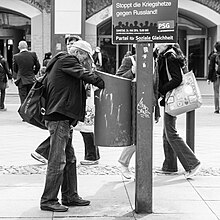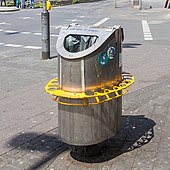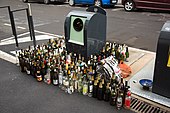 A canner in Germany | |
| Occupation | |
|---|---|
Activity sectors | Recycling |
| Description | |
Related jobs | waste picker |
A canner participates in canning, the collection and redemption of deposit-marked beverage containers for recycling. [1] Canning is an activity undertaken by individuals or small teams, typically to earn an income. [2] Canning is only possible in nations, states, or municipalities which have enacted container-deposit legislation. [2] [3]
Container deposits
The primary aim of container-deposit legislation is mitigation of the environmental impact of materials used in the creation of the containers, especially plastic. [2] [4] Another purpose is to facilitate the recycling of container materials such as glass and aluminum, as well as plastic. [2] As there is a wide variety across different political entities which operate container-deposit programs, in terms of infrastructural support and deposit amount, the economic viability of canning as an income-generating activity varies from municipality to municipality. [2] In some places, container-deposit programs have resulted in drastic reductions in street litter and increases in recycling. [5] In 2012, the German Federal Environment Agency reported that 96% of deposit-market containers were returned via their program. [2]
Sociology
Canners, or those who collect and redeem deposit-marked beverage containers, are a familiar sight in many cities, whether combing areas following major events, searching through trash containers, or transporting their collected bottles and cans to redemption sites. [6]
Sociologists have made several observations about canning. In a 2014 dissertation, Sebastian J. Moser stated that it is not poverty that unites the "otherwise very heterogeneous group of bottle collectors, but the longing for a fixed daily structure and a task that is reminiscent of work." [7] [8] Canning activity can also be a source of community in a group often characterized by solitary experiences and disconnection. Income from canning varies widely between individuals. In New York City, where as many as 8,000 people support themselves this way, [9] canning can often bring in over 100 to 200 dollars a day for the canner. [10] In Germany, canners earn an average of 100 to 150 euros each month. Another study indicated German canners earn around 3 to 10 euros each day. [11] In addition to income, canners have stated that the activity can be a hobby, for pleasure or productivity, as well as done for the purpose of improving the environment. [12]
The sociologist Stefan Sell sees lack of income as the primary motivation for canning. In particular, he notes the sharp rise in low-wage jobs, the fall in collective bargaining in many industries and the devaluation of the welfare state model since the early 1990s as causes for the emergence of this employment. [13] In Germany, canners have become symbols of an increasingly poor society. [14]
According to the social scientists Catterfeld and Knecht, it is not only expected yields in terms of income which give insight into the phenomenon of canning. Another factor is availability of materials, or the readiness of consumers to leave bottles and cans in places accessible by canners. In Germany, shifts in public perception over time resulted in more material being offered by consumers specifically to canners, and a shift in perceived social stigma of canning as an occupation. These shifts have been attributed to shifts in legislation, as well as the cultural impact of increased canner visibility during the 2006 World Cup. [12] [13]
Demographic of canners
In New York City, canners are an ethnically diverse community, with the vast majority of them living below the poverty line. [9] Among canners at Sure We Can, a redemption center in Brooklyn, around 25 percent of the canners are over the age of 60, 7 percent are physically disabled, and 5 percent experience chronic homelessness. [9] In Brooklyn, the canners are largely immigrants. [9] About 75 percent of canners at Sure We Can were born outside the United States, with 54 percent of all the canners identifying as Latinx/Hispanic. [9]
In Germany, 80-85% of canners are male, and a majority are over the age of 65. The second largest group is young immigrants. [11] Many experience poverty, but homelessness is relatively uncommon. [13]
Canning in the United States
New York City
New York City is a hotbed of canning activity largely due to the city's high population density mixed with New York state's current deposit laws. [3] Canning remains a contentious issue in NYC with the canners often facing pushback from the city government, the New York City Department of Sanitation, and other recycling collection companies. [15] Sure We Can, a redemption center co-founded by nun Ana Martinez de Luco, is the only canner friendly redemption center in the city, providing lockers and communal space for the canners to sort their collections of redeemables. [16]
Images of canning
See also
References
- ^ Newman, Andy (2019-12-26). "Where Rent Is $13,500, She Lives Off What's Left at the Curb". The New York Times. ISSN 0362-4331. Retrieved 2020-04-22.
- ^ a b c d e f Schüler, Kurt (June 2015). "Aufkommen und Verwertung von Verpackungsabfällen in Deutschland im Jahr 2012" (PDF). Texte. Umwelt Bundesamt.
- ^ a b Watt, Cecilia (2019-03-01). "New York's canners: the people who survive off a city's discarded cans". The Guardian. ISSN 0261-3077. Retrieved 2020-04-22.
- ^ staff/francesca-berardi (2018-08-08). "Inside The World Of NYC 'Canners' Who Survive By Collecting Recyclable Cans & Bottles". Gothamist. Archived from the original on 2020-06-30. Retrieved 2020-04-22.
- ^ "Why Bottle Deposits Work for Some States". Global Trash Solutions. 2018-04-13. Retrieved 2020-06-01.
- ^ Berardi, Francesca (2019-03-01). "Meet the street nun helping people make a living from New York's cans". The Guardian. ISSN 0261-3077. Retrieved 2020-04-22.
- ^ "DER SPIEGEL | Online-Nachrichten". www.spiegel.de. Retrieved 2020-04-22.
- ^ "37°: Die Pfandjäger". www.3sat.de (in German). Retrieved 2020-04-22.
- ^ a b c d e "Informal Recyclers Fight for Survival in Gentrifying Brooklyn". NACLA. Retrieved 2020-06-01.
- ^ Newman, Andy (2019-12-26). "Where Rent Is $13,500, She Lives Off What's Left at the Curb". The New York Times. ISSN 0362-4331. Retrieved 2020-06-01.
- ^ a b "Flaschensammler - Männlich, einsam, über 65". Deutschlandfunk Kultur (in German). Retrieved 2020-04-22.
- ^ a b Knecht, Alban (2015). "Flaschensammeln – Eine Einführung". Spiegel Online.
- ^ a b c "Flaschensammler und ihr Alltag - Für eine Handvoll Euro". Deutschlandfunk (in German). Retrieved 2020-04-22.
-
^ Rau, Alexandra (9 March 2016). Alltag Flaschensammeln Ethnographie einer informellen Arbeitspraxis. Herbert Utz Verlag. München.
ISBN
978-3-8316-4323-3.
OCLC
939107525.
{{ cite book}}: CS1 maint: location missing publisher ( link) - ^ Nir, Sarah Maslin (2016-03-20). "New York City Fights Scavengers Over a Treasure: Trash". The New York Times. ISSN 0362-4331. Retrieved 2020-04-22.
- ^ Kilgannon, Corey (2015-06-19). "A 'Street Nun' Who Specializes in Redemption". The New York Times. ISSN 0362-4331. Retrieved 2020-04-22.














